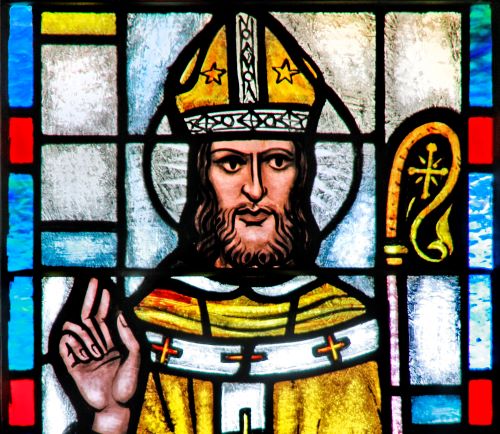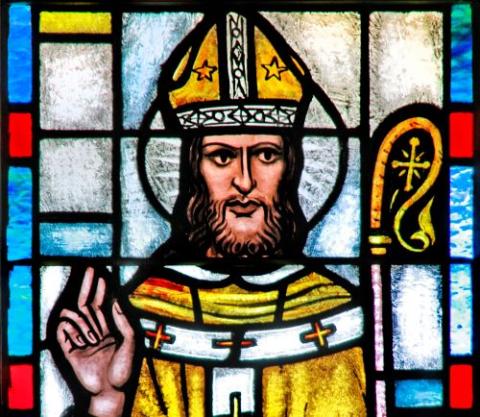
The likeness of St. Isidore of Seville is seen at St. Anthony's Church in Manteca, Calif. The saint is the patron of an online Catholic-run public charter school in Oklahoma that was to have open this fall. (OSV News/The Crosiers/Gene Plaisted)
Almost two months after the Oklahoma Supreme Court ruled that publicly-funded religious charter schools in that state are unconstitutional, a state school board on Aug. 12 rescinded its contract with St. Isidore of Seville Virtual Catholic Charter School.

The likeness of St. Isidore of Seville is seen at St. Anthony's Church in Manteca, Calif. The saint is the patron of an online Catholic-run public charter school in Oklahoma that was to have open this fall. (OSV News/The Crosiers/Gene Plaisted)
The Oklahoma Statewide Charter School Board voted unanimously to rescind the contract, with a caveat that the agreement would be reinstated if the Oklahoma Supreme Court reverses its decision or if its ruling is overturned by the U.S. Supreme Court.
In two previous meetings, the Statewide Charter School Board in Oklahoma had opted not to rescind the contract, with board members saying that they wanted to let the appeals process play out in court. However, the state's high court declined on Aug. 5 to stay its ruling that the school's contract had to be rescinded.
Oklahoma Attorney General Gentner Drummond had asked the state Supreme Court to compel the board to rescind the contract, a request the court did not act on. In a prepared statement on Aug. 12, Drummond said St. Isidore represents "a serious threat to the religious liberty of all four million Oklahomans."
"While it is appalling that the Board took so long to recognize the authority of the Oklahoma Supreme Court, I am pleased that board members finally fulfilled their duty," Drummond, a conservative Republican who broke with state lawmakers in his party by opposing the school, said in a statement.
Catholic Church officials in Oklahoma and attorneys representing the school have said they plan to appeal the state high court's June 25 ruling to the U.S. Supreme Court, which can hear direct appeals of state supreme court rulings.
If the high court decides to hear the case, it would be poised to issue a landmark ruling on whether taxpayer money can be used to support parochial schools, a decision that would likely have significant ramifications for the separation of church and state.
Oklahoma Attorney General Gentner Drummond said St. Isidore represents "a serious threat to the religious liberty of all four million Oklahomans." (OSV News/Legislative Service Bureau/Abi Ruth Martin)
St. Isidore of Seville Catholic Virtual Charter School was to open this fall, operated by the Archdiocese of Oklahoma City and the Diocese of Tulsa, with religious teaching as part of its curriculum.
"The recent procedural developments have not altered St. Isidore's plans or its commitment to bringing the best educational opportunities possible to communities across Oklahoma," said John Meiser, director of the Lindsay and Matt Moroun Religious Liberty Clinic at the University of Notre Dame. The clinic is providing legal assistance to St. Isidore.
"We continue to work to ensure that the school will be able to fulfill this worthy mission and to remedy the Oklahoma Supreme Court's errant decision condoning discrimination against religious educators," Meiser told National Catholic Reporter in an emailed statement.
On June 25, the Oklahoma Supreme Court voted 7-1 that the Statewide Virtual Charter School Board's decision in 2023 to approve the Catholic charter school's application violated the U.S. Constitution's Establishment Clause, which prohibits the government from establishing religion.
The state high court also determined that St. Isidore violated provisions of the Oklahoma state constitution and the state's charter school law that explicitly prohibit public money from being used to support sectarian activities.
In a joint statement posted on the school's website shortly after the June 25 ruling, Oklahoma City Archbishop Paul Coakley and Tulsa Bishop David Konderla said the court's decision was "very disappointing" for "hundreds of prospective students and their families."
"We will consider all legal options and remain steadfast in our belief that St. Isidore would have and could still be a valuable asset to students, regardless of socioeconomic, race or faith backgrounds," the bishops said.
Advertisement
The contract that the Oklahoma Statewide Virtual Charter School Board signed with St. Isidore's board in October stipulated that the school would be free and open to all students "as a traditional public school," and that it would comply with local, state and federal laws pertaining to the education of children with disabilities and who are identified as English language learners.
While the contract said that St. Isidore would ensure that no student is denied admission based on race, sex, sexual orientation, gender identity or gender expression, its language also recognizes that the school may have "certain exemptions or entitlements" from laws and regulations based on its status as a religious organization.
In October, Drummond, the state's attorney general who opposed St. Isidore, petitioned the Oklahoma Supreme Court to stop what he described as the state's "unlawful sponsorship" of a sectarian school.






